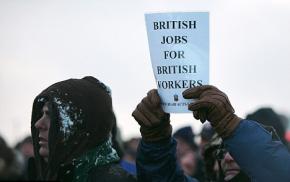A strike for “British jobs?”
looks at the debate over wildcat strikes that demanded "British jobs for British workers."
AT FIRST glance, you'd think that all socialists and progressives would be excited by the news of a recent wave of wildcat strikes across Britain.
Challenging reactionary labor laws that forbid "secondary action"--or sympathy strikes--thousands of workers have walked off construction sites and out of power plants in protest at the bosses' attempts to use contract labor to undermine union strength and national bargaining agreements. These illegal strikes represent workers' first independent action against an economic crisis that is hitting Britain harder than most major industrialized countries.
Unfortunately, however, the recent strikes are more complicated than this suggests. Rather than target their anger squarely against employers and Prime Minister Gordon Brown's New Labour government, some of the striking workers have adopted the nationalist slogan "British Jobs for British Workers"--opening the door for the far right to target immigrant workers as the cause of unemployment.
The first dispute began January 28, at the Lindsey oil refinery in Lincolnshire, in eastern England.

Lindsey is owned by giant multinational energy corporation Total. In 2006, Total drew up plans to extend the plant's capacity to refine diesel fuel, and gave the contract for the necessary construction work to the California-based firm Jacobs, which in turn sub-contracted some of the work to the Italian-based IREM.
Hundreds of workers at Lindsey took unofficial--that is, not backed by union officials--strike action when they learned that IREM was bringing in non-union Italian and Portuguese labor to work on the expansion project. "We are angry that workers have been taken on from outside the UK when people here are out of work," one union shop steward told the BBC.
Although IREM and Total claimed that the contract required the use of "specialist" Italian labor, workers at Lindsey demanded that unemployed skilled workers from the local community be given the chance to apply for the new jobs.
The events at Lindsey cleared resonated with thousands of skilled workers across the UK, who are currently living under the threat of a crisis in the crucial construction and manufacturing sectors. Within a couple of days, workers--mostly members of the Unite and GMB unions--were taking unofficial solidarity action at power stations and construction sites across Britain. There were also protests and walkouts at more than a dozen locations, from Aberdeen in the north of Scotland to Hampshire on the south coast of England.
INVOLVING THOUSANDS of workers acting independently of their unions, these strikes threatened to become Britain's biggest labor battle in many years. Almost as soon as the dispute began, however, the slogan "British Jobs for British Workers" began to appear on placards at picket lines.
The phrase belongs to Gordon Brown, who uttered it in a speech in October 2007, and the workers were obviously keen to target Brown's hypocrisy. Brown's New Labour government has actively pursued a neoliberal project to undercut wages and union strength by facilitating the flow of cheap labor throughout the European Union (EU). As the prime minister well knew, there are no such things as purely "British" jobs these days.
Nevertheless, the slogan "British Jobs for British Workers" also expresses nationalist and nativist sentiments among workers.
Certainly the British media portrayed this as a struggle not between workers and bosses, but between workers from different countries. And the far right was quick to respond, with the fascist British National Party (BNP) supporting the strike, visiting picket lines, and setting up front groups to push its anti-immigrant agenda among the workers. The strikers also received favorable coverage in right-wing and anti-union tabloid newspapers such as The Sun.
For this reason, the Lindsey strikes have divided the British left. Some socialists have stressed the dangerous nationalism inherent in the "BJ4BW" slogan, while others immersed themselves in the protests and argued for solidarity between British and migrant workers.
Socialists have been able to address mass meetings of the strikers and resist the presence of the fascists on the picket lines, and may have had some influence in moving the thrust of the protests to the left. Undoubtedly, though, millions of workers around Britain will see these as primarily nationalist strikes, and the danger is that they will think that driving out foreign workers is a viable way of fighting the recession.
The Lindsey strike was settled February 5 when workers voted to accept a deal that will provide jobs to 102 British workers--including 67 skilled positions--out of a total of 195. No Italian contract workers will lose their jobs.
At this stage, the effect of these protests is still unclear. But one thing is certain: the strikes express the fear and anger of workers in the face of a bitter recession and reflect their desire to take militant action to defend jobs, wages and union strength. The events at Lindsey therefore are likely a prelude to future struggles.
The question, however, is which direction these struggles will take. New Labour's move to the right has angered and embittered many British workers, and the weakness of the left has allowed the BNP to fill some of the vacuum. Any successful struggle against neo-liberalism and unemployment will require workers to reject the slogans of the far right and unite with immigrant workers against the bosses, the government and the EU.


